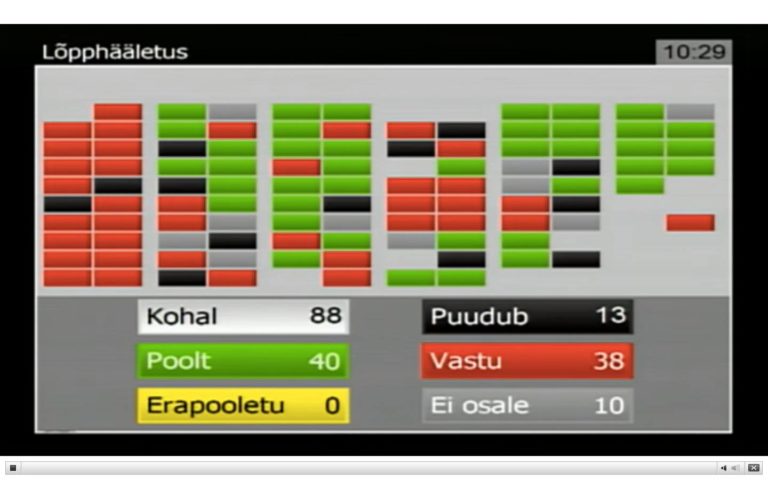Over the course of 2015, it has become clear that Eastern Europe and Central Asia is moving towards a division into two groups of countries: one moving closer towards the rule of law and the other experiencing a strong conservative backlash. These general sociopolitical trends greatly affect LGBT people and determine the direction of LGBT advocacy in the region.
Recent successes in the region include the enactment of a non-discrimination bill that protects LGBT people in Ukraine, the introduction of a same-sex cohabitation law in Estonia, the adoption of antidiscrimination and hate crime protections for LGBT people in Georgia, and the creation of effective enforcement mechanisms for antidiscrimination provisions in Moldova.

Capture: Estonian Parliament voting for Cohabitation law.
However, in other countries of the region, increasing conservatism has led to stronger negative attitudes towards LGBT people, in the form of violence, stigma, and discriminatory laws and practices. For instance, in 2013, Russia introduced a law prohibiting the promotion of “non-traditional sexual relationships” among minors. Unfortunately, Russia’s gay propaganda bill has acted as a model for similar legislative initiatives in neighboring countries. There have been proposals to introduce analogous laws on gay propaganda in other countries of the region, including Armenia, Moldova, Ukraine, Kazakhstan, and Kyrgyzstan. The Kyrgyz bill, introduced in 2015, passed a second, pre-final reading at the end of the year. The bill is even more draconian than Russia’s existing law, as it imposes both administrative penalties and criminal sanctions, and would significantly limit the possibility for LGBT community organizations in the country to advocate for their interests.
Despite certain negative trends in the region, ECOM remains optimistic in its efforts to fight discrimination and homophobia towards gay, bisexual and other men who have sex with men and trans* people, and to ensure the access of these populations to HIV services, thanks to recent successes in community advocacy initiatives. The diverse experience of civil society advocacy in countries of the region has demonstrated the need to ensure that LGBT activists and organizations collaborate with various civil society stakeholders and develop coherent advocacy strategies to increase the effectiveness of their actions.
Entering 2016, it is crucial that ECOM and other MSM-service and LGBT organizations in the region continue to demand protections from discrimination based on sexual orientation or gender identity, and to build broad coalitions with civil society and international stakeholders in order to counteract the growing homo- and transphobic and discriminatory trends in the region.
